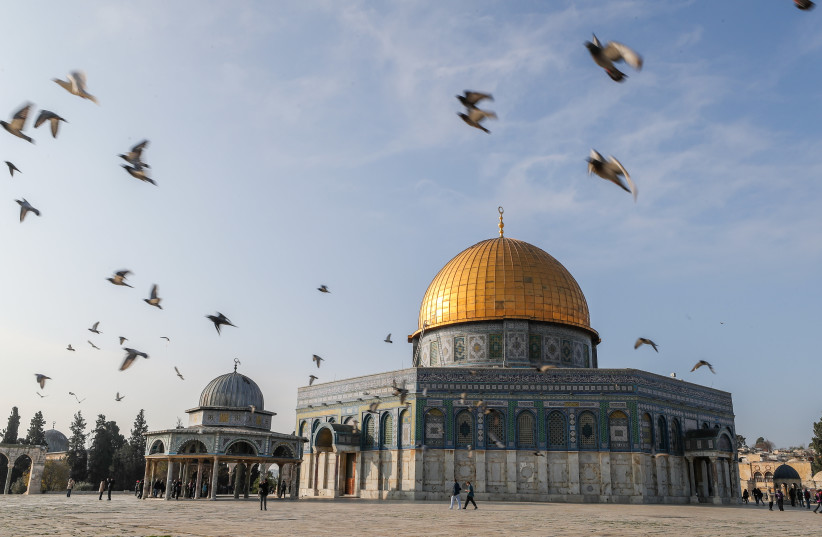The Palestinian Authority and Jordan were quick to condemn National Security Minister Itamar Ben-Gvir’s 15-minute visit to al-Aqsa Mosque compound (the Temple Mount) on Tuesday morning.
Both the PA and Jordan seek to be known among the Arabs and Muslims as “defenders” of the Islamic holy sites in Jerusalem, including the Aqsa Mosque compound. So do other parties, such as Hamas and Palestinian Islamic Jihad.
According to the PA, Ben-Gvir’s visit was part of Israel’s policy to change the “historical status quo” at the site by allowing Jews to pray there on a regular basis.
The PA is convinced that Israel is working to divide the Temple Mount in time and space between Muslim and Jewish worshipers.
The PA believes that Israeli plans concerning al-Aqsa Mosque compound are within the context of a larger scheme to “Judaize” the site and the entire city of Jerusalem.

Although the PA has no official status at the site, it has been acting behind the scenes over the past few years to establish a foothold there.
The PA’s efforts intensified in the aftermath of recurring attempts by Hamas and Islamic Jihad to present themselves as the main “defenders” of Aqsa Mosque against alleged Jewish schemes and conspiracies.
For Jordan, the most important thing is to ensure that the Hashemite custodianship over the Islamic and Christian holy sites in Jerusalem (including al-Aqsa Mosque compound) not be undermined or eliminated.
This custodianship is crucial for the Jordanian monarch and the royal family because, they believe, it bolsters their political and religious standing among many Arabs and Muslims.
Relations between Israel and Jordan appeared to have improved significantly under the former government headed by Naftali Bennett and Yair Lapid. This was in sharp contrast to the tensions that existed between the kingdom and the previous government headed by Prime Minister Benjamin Netanyahu.
At that time, tensions reached a peak when reports in some media outlets suggested that the Netanyahu government was seeking to give other Arabs, specifically Saudi Arabia, a role in administering the Aqsa Mosque compound, which has long been controlled by Jordan’s Wakf Islamic religious trust in east Jerusalem.
The return of Netanyahu to power has revived the fears of the Jordanians. Like the Palestinians, Jordan also believes that Israel is seeking to change the status quo at the holy site. The Jordanians fear that Israel is not only trying to pave the way for Jewish prayers, but it also wants to end the Hashemite custodianship over the site.
The strong condemnations emanating from Ramallah and Amman in response to Ben-Gvir’s visit aim to send a warning to the new Netanyahu government not to tamper with the Islamic holy site.
Global response
The condemnations are also directed toward the US administration and other countries with the hope that they will pressure Netanyahu to refrain from “imposing a new reality” at the site.
PA Prime Minister Mohammad Shtayyeh denounced the visit as “a dangerous challenge to the feelings of all Palestinians.” He called on Palestinians to “thwart” the purported Israeli attempt to turn the mosque into a synagogue.
PA presidential spokesman Nabil Abu Rudeineh said Ben-Gvir’s visit was “a challenge to our Palestinian people, the Arab nation and the international community.”
The continuation of these “provocations against our Islamic and Christian holy sites will lead to more tension and violence,” he said.
Abu Rudeineh said the Israeli government was responsible for any repercussions regarding its “racist policies.”
Attempts by Israel “to change the historical and legal status quo reality at al-Aqsa Mosque are rejected and doomed to failure,” he said.
Abu Rudeineh called on the US administration to assume its responsibilities and force Israel to stop its “escalation and storming of al-Aqsa Mosque before it is too late.”
Jordan also condemned the “storming” of the Aqsa Mosque compound by Ben-Gvir.
The Jordanian Ministry of Foreign Affairs said it had summoned the Israeli ambassador in Amman and conveyed to him a message of protest against Ben-Gvir’s “storming” of the Aqsa Mosque.
The “storming of al-Aqsa Mosque by an Israeli cabinet member and violating its sanctity is a condemned and provocative act and amounts to a flagrant violation of international law, as well as of the historical and legal status quo in Jerusalem and its sanctities,” Jordanian Ministry of Foreign Affairs spokesman Sinan Majali said in a statement.
The international community should take swift and decisive action to put an end to the Israeli practices, he said. Israel was solely accountable for the grave consequences of this escalation, which threatens undermining all efforts made to prevent an upsurge in violence that endangers security and peace, he added.
Majali demanded that Israel immediately cease all efforts to alter the legal and historical status quo and impose spatial or temporal divisions.
